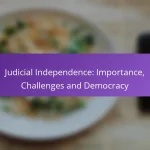Democracy and human rights are intrinsically connected, with each serving to reinforce the other. Democratic governance prioritizes individual freedoms and equality, establishing mechanisms that hold authorities accountable and ensure the protection of human rights. By fostering active civil societies and implementing protective laws, democracies create environments where human rights are respected and upheld globally.
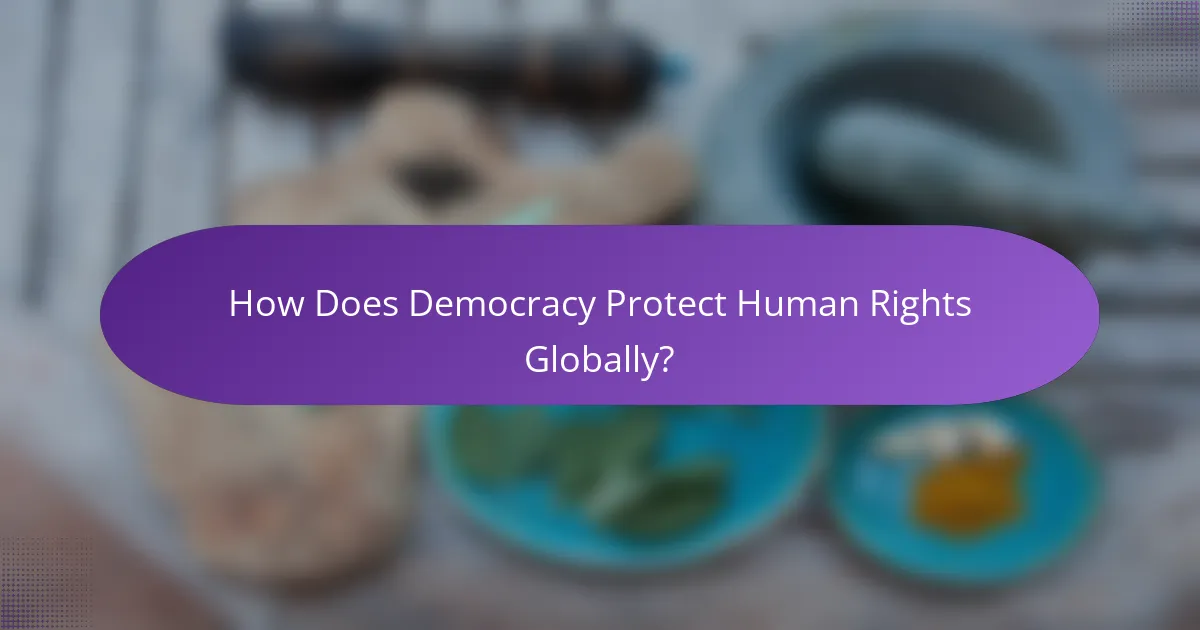
How Does Democracy Protect Human Rights Globally?
Democracy safeguards human rights by establishing systems of governance that prioritize individual freedoms, equality, and justice. Through participatory mechanisms, democratic societies create frameworks that hold authorities accountable, ensuring that human rights are respected and upheld.
Framework of democratic governance
The framework of democratic governance includes institutions and processes that promote transparency, accountability, and citizen participation. Key elements such as free elections, an independent judiciary, and a vibrant civil society play crucial roles in protecting human rights. These components work together to create an environment where individuals can express their rights without fear of repression.
Additionally, democratic governance often incorporates checks and balances that prevent the abuse of power. This structure allows for the protection of minority rights and the promotion of social justice, which are essential for a healthy democracy.
International human rights treaties
International human rights treaties establish global standards that democracies are encouraged to adopt and implement. Agreements such as the Universal Declaration of Human Rights and the International Covenant on Civil and Political Rights outline fundamental rights that all individuals should enjoy. Countries that ratify these treaties commit to upholding these rights within their jurisdictions.
Compliance with these treaties often influences a nation’s reputation and relationships on the global stage. Countries that demonstrate a strong commitment to human rights can benefit from international support, trade agreements, and diplomatic relations, while those that violate these standards may face sanctions or isolation.
Case studies of successful democracies
Successful democracies, such as Sweden and Canada, provide valuable examples of how democratic governance can effectively protect human rights. In Sweden, strong legal frameworks and active civil society organizations work together to ensure that human rights are integrated into public policy and practice. This approach has led to high levels of social welfare and equality.
Similarly, Canada’s Charter of Rights and Freedoms enshrines fundamental rights and freedoms, allowing citizens to challenge injustices through the legal system. These case studies illustrate that when democracies prioritize human rights, they foster inclusive societies where individuals can thrive and contribute to the common good.
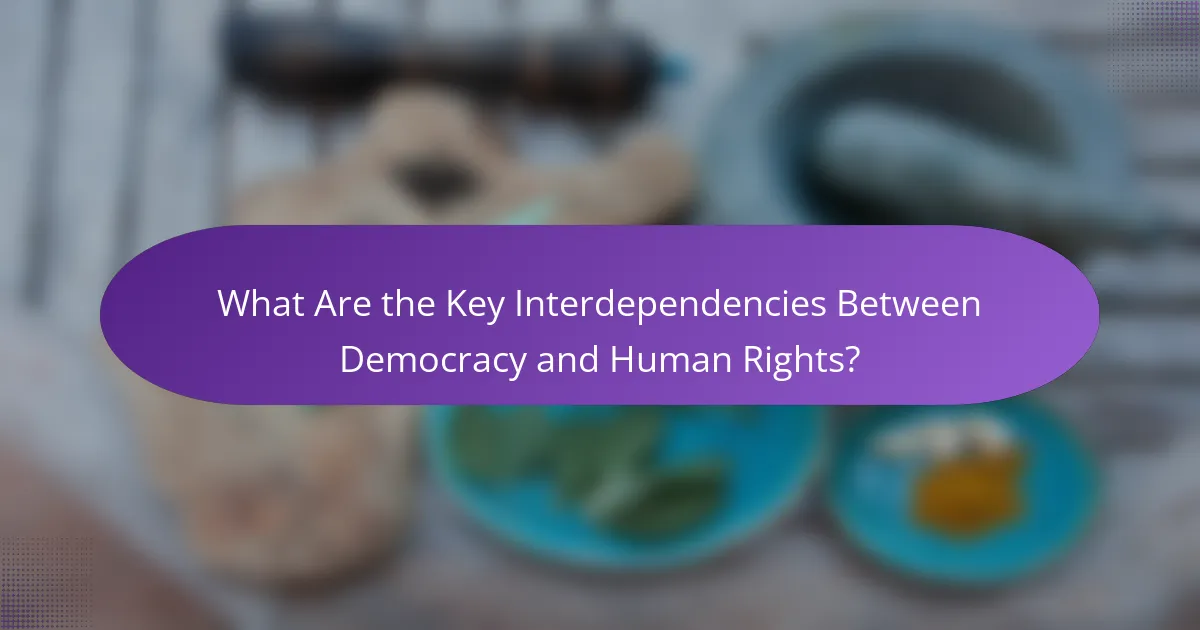
What Are the Key Interdependencies Between Democracy and Human Rights?
Democracy and human rights are closely linked, with each reinforcing the other. A functioning democracy promotes the protection of human rights, while respect for human rights strengthens democratic governance.
Mutual reinforcement of principles
The principles of democracy and human rights are mutually reinforcing. Democratic systems provide a framework for individuals to express their rights, such as freedom of speech and assembly. In turn, the protection of these rights ensures that citizens can participate actively in the democratic process.
For example, countries with strong democratic institutions often have robust legal protections for human rights, leading to greater civic engagement and accountability. This cycle creates a more resilient society where both democracy and human rights can thrive.
Impact on social justice
The interdependence of democracy and human rights significantly impacts social justice. Democratic governance allows for the representation of marginalized groups, ensuring their voices are heard in policy-making. When human rights are upheld, social inequalities can be addressed more effectively.
In practice, this means that democratic countries are often better equipped to implement social justice initiatives, such as anti-discrimination laws and equitable access to resources. This creates a more inclusive society where all individuals have the opportunity to succeed.
Economic implications
The relationship between democracy and human rights also has notable economic implications. Democracies tend to foster environments that encourage investment and economic growth, as they provide stability and predictability. When human rights are respected, businesses can operate without fear of arbitrary actions or discrimination.
Moreover, countries that prioritize human rights often see improved economic performance. For instance, nations that protect labor rights and promote fair working conditions tend to experience higher productivity and innovation. This highlights the importance of integrating human rights into economic policies for sustainable development.
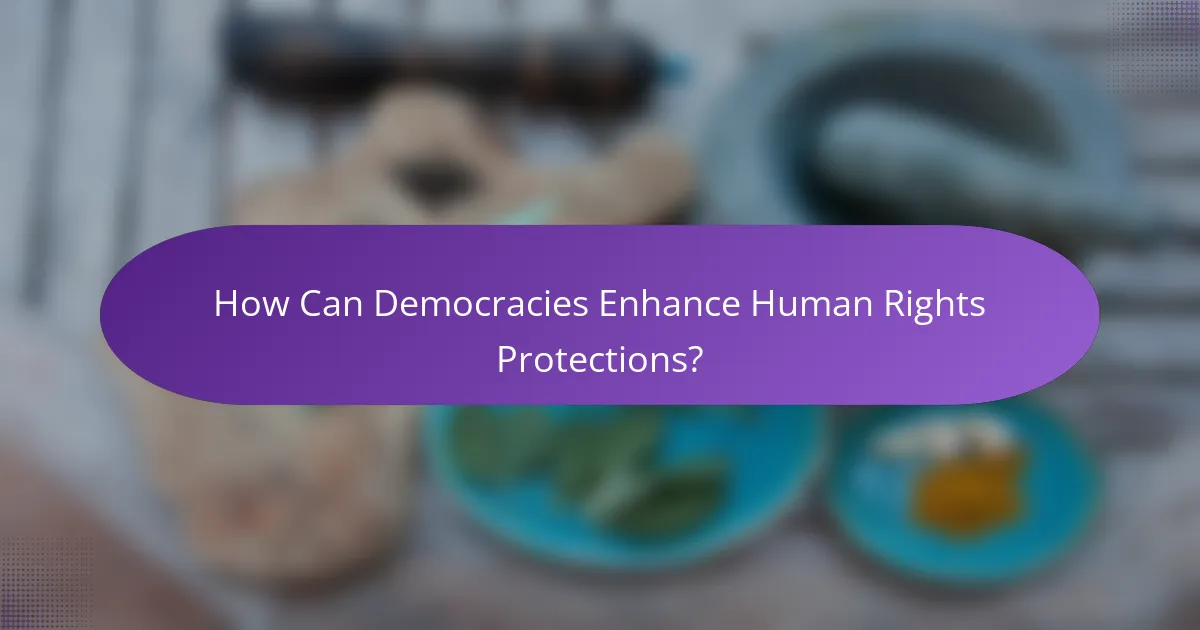
How Can Democracies Enhance Human Rights Protections?
Democracies can enhance human rights protections by implementing laws that safeguard individual freedoms, fostering active civil societies, and engaging in international partnerships. These strategies create an environment where human rights are respected and upheld.
Legislative reforms
Legislative reforms are crucial for establishing a legal framework that protects human rights. Democracies should prioritize enacting laws that address discrimination, freedom of speech, and the right to a fair trial. For example, countries can adopt anti-discrimination laws that protect marginalized groups.
Regular reviews of existing laws can help identify gaps in human rights protections. Policymakers should engage with stakeholders, including human rights organizations, to ensure that new legislation reflects the needs of the population.
Strengthening civil society
Strengthening civil society is essential for promoting human rights awareness and advocacy. Democracies can support non-governmental organizations (NGOs) by providing funding and resources, allowing them to effectively monitor human rights abuses and advocate for change.
Encouraging public participation in decision-making processes can empower citizens and enhance accountability. Initiatives such as community forums and public consultations can help gather diverse perspectives and foster a culture of respect for human rights.
International cooperation
International cooperation plays a vital role in enhancing human rights protections. Democracies should engage in treaties and agreements that commit them to uphold global human rights standards. For instance, participation in the United Nations Human Rights Council can facilitate dialogue and accountability.
Collaborating with other nations on human rights issues can lead to shared best practices and resources. Joint initiatives, such as training programs for law enforcement on human rights, can improve local enforcement and compliance with international norms.
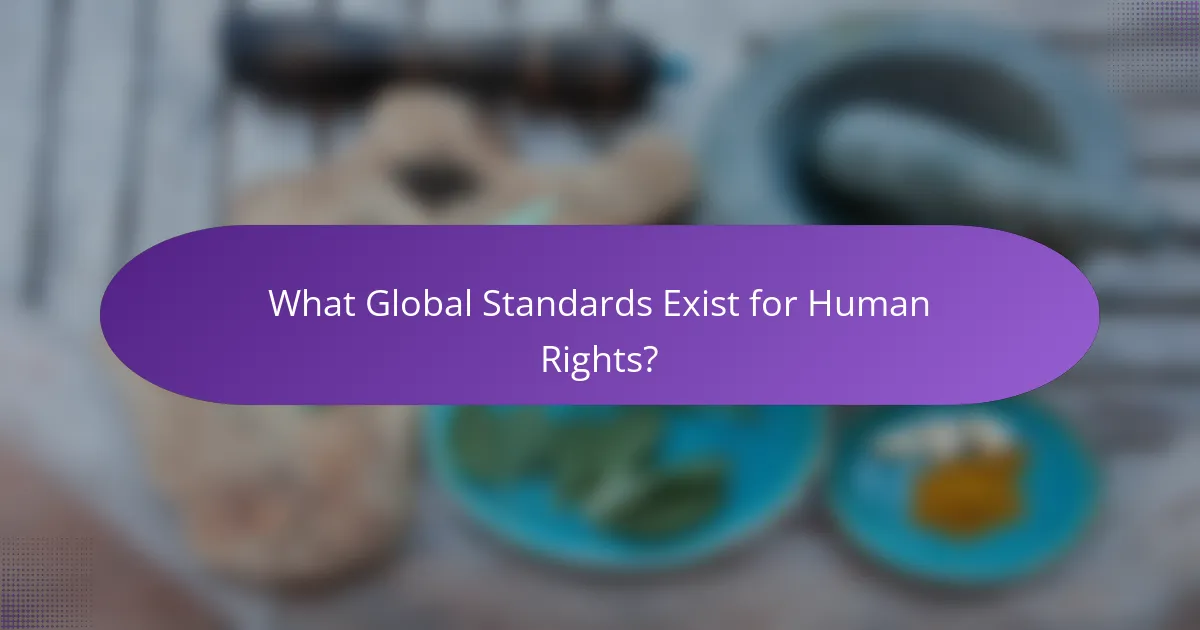
What Global Standards Exist for Human Rights?
Global standards for human rights serve as benchmarks for protecting individuals’ dignity and freedoms across nations. These standards are established through various international agreements and declarations that aim to ensure fundamental rights are universally recognized and upheld.
Universal Declaration of Human Rights
The Universal Declaration of Human Rights (UDHR), adopted by the United Nations in 1948, is a foundational document that outlines basic human rights to be universally protected. It includes rights such as the right to life, liberty, and security, as well as freedom of expression and religion.
The UDHR is not legally binding but serves as a guiding framework for countries to develop their own laws and policies. Its principles have influenced numerous national constitutions and international treaties, promoting a global culture of human rights.
Regional human rights instruments
Regional human rights instruments complement the UDHR by addressing specific cultural and political contexts. Examples include the European Convention on Human Rights, the American Convention on Human Rights, and the African Charter on Human and Peoples’ Rights.
These instruments often establish regional courts or committees to oversee compliance and adjudicate violations, making them more enforceable than the UDHR. Countries that ratify these agreements commit to uphold the rights outlined within them, providing a framework for accountability.
Monitoring and enforcement mechanisms
Monitoring and enforcement mechanisms are crucial for ensuring adherence to human rights standards. Various bodies, such as the United Nations Human Rights Council and regional human rights courts, monitor compliance and investigate violations.
These mechanisms can include periodic reviews of member states, individual complaints processes, and public reporting on human rights conditions. Countries are encouraged to cooperate with these bodies to improve their human rights practices and address any shortcomings effectively.
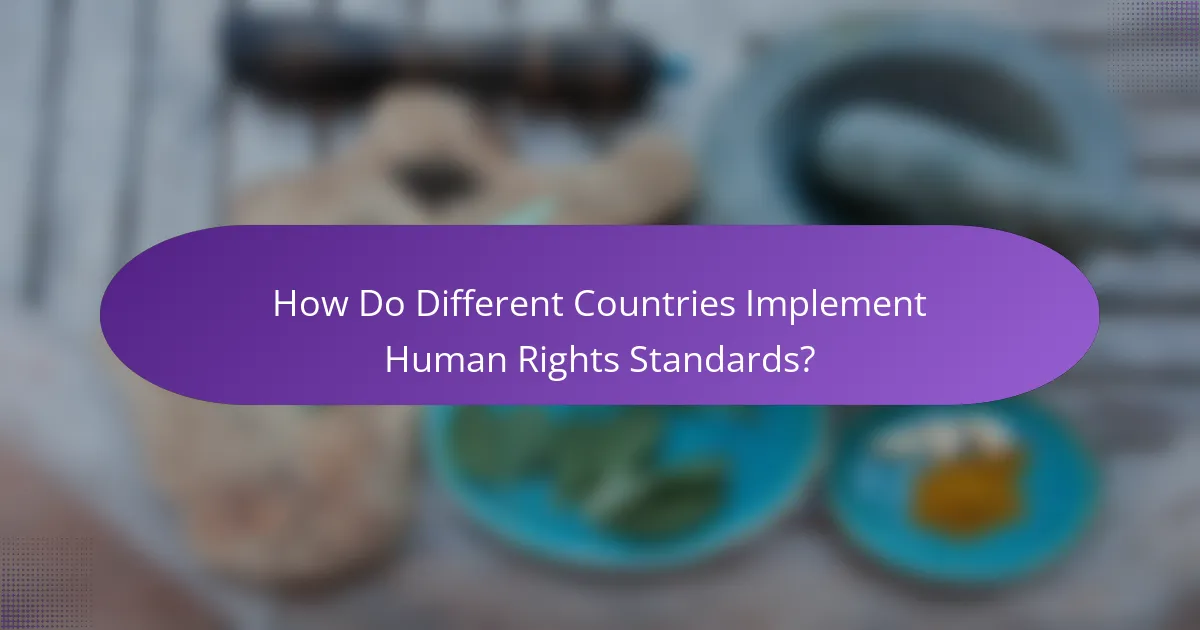
How Do Different Countries Implement Human Rights Standards?
Countries implement human rights standards through various legal frameworks, policies, and practices that reflect their unique cultural, political, and social contexts. The effectiveness of these implementations can vary significantly based on governance structures, public awareness, and international obligations.
Comparative analysis of countries
Different nations adopt distinct approaches to human rights standards based on their historical and cultural backgrounds. For instance, Scandinavian countries often rank high in human rights protection due to strong social welfare systems and active civil societies, while some authoritarian regimes may prioritize state security over individual freedoms.
In contrast, countries like the United States emphasize civil liberties and judicial independence, yet face criticism for systemic inequalities. Understanding these differences helps in assessing the effectiveness of human rights implementations globally.
Best practices in implementation
Effective implementation of human rights standards often involves a multi-faceted approach that includes strong legal frameworks, active civil society participation, and regular training for law enforcement. Countries that have successfully integrated human rights into their legal systems, such as Canada and Germany, often see better compliance and enforcement.
Furthermore, public awareness campaigns and education programs can empower citizens to advocate for their rights. Establishing independent human rights institutions can also enhance accountability and transparency in governance.
Challenges faced by nations
Many countries encounter significant challenges in implementing human rights standards, including political resistance, lack of resources, and cultural barriers. In some regions, entrenched power structures may obstruct reforms, while in others, economic constraints limit the ability to enforce rights effectively.
Additionally, the global landscape of human rights is often complicated by geopolitical interests, where nations may prioritize strategic alliances over human rights commitments. Addressing these challenges requires sustained international cooperation and commitment to universal human rights principles.
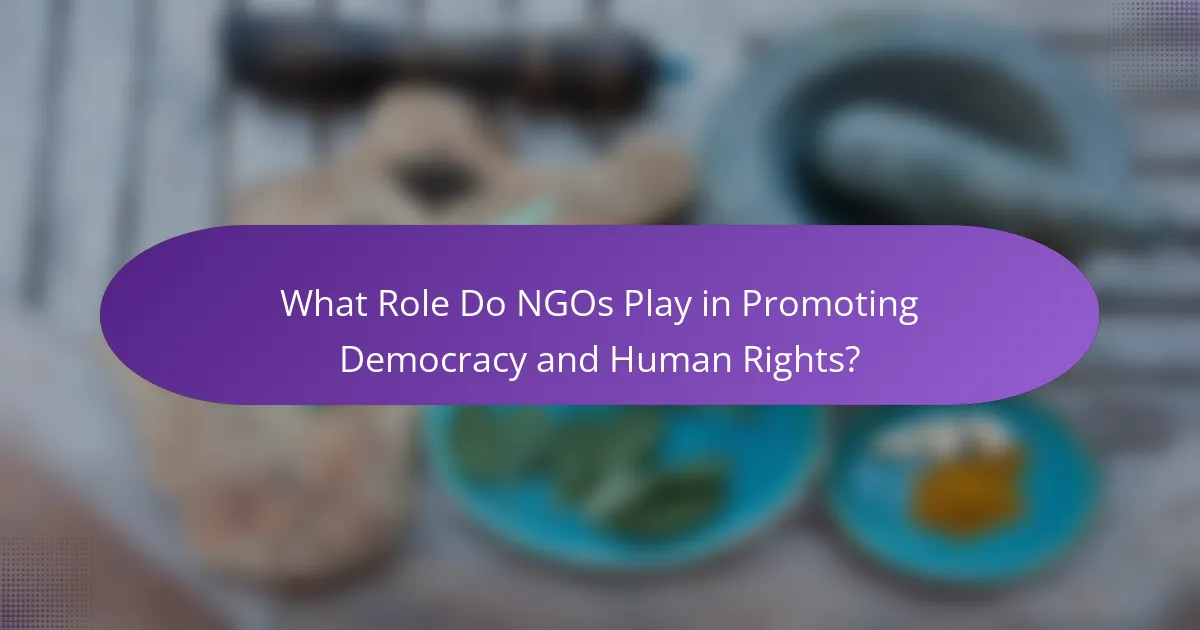
What Role Do NGOs Play in Promoting Democracy and Human Rights?
Non-governmental organizations (NGOs) play a crucial role in promoting democracy and human rights by advocating for policy changes, raising awareness, and providing support to marginalized communities. They often serve as watchdogs, holding governments accountable and ensuring that human rights standards are upheld.
Advocacy and Awareness Raising
NGOs engage in advocacy to influence public policy and promote democratic values. They organize campaigns, publish reports, and utilize social media to raise awareness about human rights violations. For example, organizations like Amnesty International mobilize public opinion to pressure governments into respecting human rights.
Monitoring and Reporting
Monitoring human rights practices is a key function of NGOs. They collect data, document abuses, and report findings to international bodies, which can lead to sanctions or interventions. This monitoring often highlights issues that may be overlooked by governments, ensuring that violations are brought to light.
Supporting Local Communities
NGOs provide essential support to local communities by offering legal assistance, education, and resources to empower individuals. They often work on the ground to help marginalized groups, such as refugees or ethnic minorities, navigate legal systems and access their rights. This grassroots approach fosters resilience and strengthens democratic participation.
Collaboration with International Bodies
Many NGOs collaborate with international organizations, such as the United Nations, to promote global human rights standards. They participate in conferences, contribute to policy discussions, and help implement international treaties at the local level. This collaboration enhances the effectiveness of human rights initiatives worldwide.


